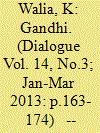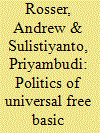| Srl | Item |
| 1 |
ID:
180694


|
|
|
|
|
| Summary/Abstract |
Though several countries have adopted the sexual violence law which criminalizes child marriage, the practice of early marriage persists in Sub-Saharan Africa. This paper examined the socio-economic and demographic determinants of early marriage among young women in four Sub-Saharan African (SSA) countries, namely Niger, Democratic Republic of Congo, Mali and Malawi. Descriptive and multivariate analyses were performed to show that young women without formal education have 1.62, 1.59, 1.55 and 2.08 times more risk of early union than their secondary or higher educated counterparts. The study recommends the implementation of a universal, free and compulsory basic education in SSA countries.
|
|
|
|
|
|
|
|
|
|
|
|
|
|
|
|
| 2 |
ID:
118060


|
|
|
| 3 |
ID:
128532


|
|
|
|
|
| Publication |
2013.
|
| Summary/Abstract |
Since the fall of Suharto's New Order, Indonesia's central government has substantially strengthened the legal and financial basis of universal free basic education (UFBE). Yet sub-national governments have varied considerably in their responses to the issue with some supporting UFBE and others not. Why has this happened? What are the implications for the future of UFBE in Indonesia? And what does Indonesia's sub-national experience tell us about the political preconditions for UFBE in developing countries? We try to shed some light on these questions by examining the politics of UFBE in Bantul and Sleman, two districts in the Special Region of Yogyakarta.
We argue (i) that these districts' different responses to UFBE have reflected the extent to which their bupati have pursued populist strategies for mobilising votes at election time and there has been resistance to UFBE from groups such as business, the middle classes, and teachers; (ii) that Indonesia's sub-national experience suggests that there is an alternative pathway to UFBE besides organisation of the poor by political entrepreneurs; and (iii) that the future of UFBE in Indonesia thus rests on the nature of bupatis' strategies for advancing their careers and the strength of local groups opposed to UFBE.
|
|
|
|
|
|
|
|
|
|
|
|
|
|
|
|